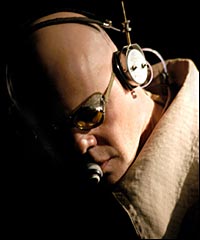 80s - Thomas Dolby (2007)
80s - Thomas Dolby (2007)
Catching Up With Musics First Professor!
Thomas Dolby became an unlikely 80s icon thanks to his unique presence in MTV videos, and his penchant for catchy synth hooks and danceable programmed beats. The keyboardist/programmer got his start in the late 70s with Bruce Woolley and the Camera Club (featuring future Buggles Trevor Horn and Geoffrey Downes), and quickly established himself as a sideman of distinction, crafting memorable synthesizer parts for a diverse array of pop and rock acts.
His own albums struck just the right chord with U.S. audiences of the early 80s who seemed to crave new-wave quirkiness with a video-friendly veneer. As the 80s and 90s progressed, Dolby focused more on production (for Joni Mitchell, among others) and film scores, releasing the occasional remix, compilation, or live album.
Indeed, before he launched a solo career, Dolby had worked as a studio musician, technician, and songwriter; his most notable work as a songwriter was New Toy, which he wrote for Lene Lovich, and Whodinis Magics Wand. In 1981, he launched a solo career, which resulted in a number of minor hits and two big hits - She Blinded Me with Science (1982) and Hyperactive (1984). Following Hyperactive, his career challenges changed as he began producing more frequently, as well as exploring new synthesizer and computer technology. Dolby continued to record into the 90s, but by that time, his music had become more personal, less pop chart superficial.
With Capitol releasing the wonderful greatest-hits collection, Retrospectacle in 1995, not much had been heard of Dolby ... until 2006 when he began touring once again. And now with the Legacy Edition of Prefab Sprouts second album Steve McQueen (a Dolby-produced hit back in 1985) readied for the US stores (August 7th, 2007), Exclusive Magazine caught up with the great man for a chat.
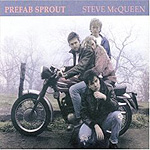
Being that you were the original producer of the 1985 Prefab Sprout album Steve McQueen, I am first wondering what got you involved in their scene back then? I was a guest reviewer on a BBC radio show called Round Table with two of their DJs and Mari Wilson. A succession of new singles came on for us to listen to and review and the radio DJs said very nice things about them ... and I hated them all, he chuckles to himself. But, I sat through about three quarters of a hour of this before the intro to a song called Dont Sing with guitar and harmonica and brilliant lyrics. Everything about it was fantastic. I was very relieved to hear one song in the show that I could be nice about, he again laughs.
And, as it turned out the band were listening to the show and they had heard my comments about all the other songs and were convinced that I was going to rip them to shreds also. So they were very much relieved that I hadd said nice things about it, he chuckles. One thing led to another about it and they told me they were looking for a producer. They did not really have demos to send me but they invited me up to their house in Cumbria. So, I went up there ... and Paddy at the time lived in this room that was no bigger than his mattress and was built on a stack of lyric sheets for songs that he had written over the years. Hundreds. He had pull a stack out, squint at them, strum them on guitar and then sing them to me over the top. They were just really amazing and I was just blown away with his songwriting.
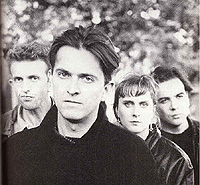
So I selected a dozen or so that would work as an album. The label gave us a green light and left us to it. The biggest task was actually the pre-production because Paddys songwriting style is to start with the lyrics and fit the chords and such to his lyrics. Which means you end up with some fairly complex arrangements, some of which have three beats in a bar or five bars in a phrase. And if that is played by a five piece band without cutting any corners you end up with a too demanding arrangement that grates a little on peoples ears.
So, a lot of the role that I played was to suggest role structures and instrumentation. And once we had that sorted out in the rehearsal room I would say that the recording was relatively easy. It was then just about capturing the best possible performance and mixing it so that you could hear everything. And that was that.
As it is now 22 years later, why did you feel it was time to remaster your work? Well, there is a difference between remixing and remastering. I did not go back to the original multi-track tapes and create new mixes from them. All I did was take the mix tapes and converted them to digital and then just used the newest technologies to master them. In those days the main medium for releasing music was vinyl and you have to make a lot of sacrifices to cut music onto vinyl. If you saw now the image of the mastering engineer in 1985 squinting through a microscope at the grooves on his acetate ... it is just so very, very different from someone manipulating wave forms on a computer. It is like H.G. Wells style technology, you know.
So, all I did was take advantage of the benefits of modern mastering technology and recut the songs. So, hopefully it does not sound that different to the original. But hopefully it sounds like it still has the warmth that the vinyl had when it originally came out.
Did you also help produce Paddys newly-reworked 8 acoustic tracks for this new Legacy release? No, I was not involved in that at all. He did those on his own at his own studio. After I had heard these songs up at Paddys house he had put them down on cassette for me, so that I had something to work with. The label originally asked if we would include those demos on the album. And Paddy was against that because he had just put them down as a way of notating them for me so that I had this scratch pad to work from. He had not put a lot of effort into them and he had literally had one microphone going into a portable cassette recorder in his bedroom. So, he preferred to go the route of making new versions of them. Which is good, because it allows you to see a different perspective on the songs.
As a songwriter and performer you mature and evolve over the years and it is a shame that the conventional music business requires you to take a single snap shot of a song the way it was in 1985 and then expect you to live or die by that for decades to come. But, in reality the way that we perform songs it varies over time and depending who the audience is, what the context is. So, I think that it is nice that he departed from the original versions of the songs and gave us a new perspective on them.
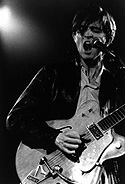
Why wasnt STEVE McQUEEN (or as it was known here TWO WHEELS GOOD) a massive success here in the US? I think it is partly that the band never toured over here. Touring was never a big thing for them. Paddy never enjoyed it very much. I think that had they made that effort over here it would have made that difference. They had a worldwide deal with a large record label, but the record label over here were never that alert to the band.
And the UK market at the time was really a singles market. It was all about TOTP, Radio One play lists, and where your last single charted. And albums were really, and I hate to be cynical, but they were the record industries way of extracting 15 quid from you because you got hooked on a single. And yeah, there were some great albums made, of course, and there was an album market to an extent independent of the singles market, but there was no infrastructure built around it. Touring was not very big those days. It was before Glastonbury and Reading and a lot of cities did not even have a live music venue. There were no radio shows, there was no MTV yet and there was no supporting infrastructure for anything other than the singles market.
So, if you are the American label and you are looking at acts signed to your UK sister label, you look for the highest charting singles band and wonder if you can make anything of them in the US. And cause the Sprouts were never really a singles charting band, it kind of belittled the following and the respect they had as an album band.
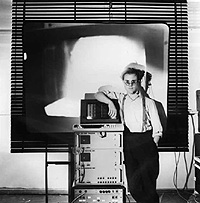
Turning the second half of this interview more towards your good self, and is it true that you spent some youth time playing keyboards in Paris Metro underground? I did indeed, yes. In fact, initially it was guitar and not keyboards. But, the first shot I took at getting a record deal - and I was still only about 19 - I actually thought I was onto something. But at the last minute it fell through and the lawyer who had been negotiating on my behalf presented me with a bill that I could not possibly pay.
So, I decided to flee the country! A school friend of mine was living in Paris [France] as a street musician/ busker and he had come back to London for a while and told me that it was a good crack out there!
So I actually went back over with him and we sat on our backsides in the Metro playing folk songs for a few months. And around that time the first portable, battery operated synth drum machine came out and that was now my main instrument and not the guitar any more. So, I started knocking out Kraftwerk and Human League tunes and things for the tourists outside of the Pompidou Center. And I also had a mime artist doing the invisible wall thing, he quietly laughs.
Is there too big of a gap to next mention your work as a songwriter for Lene Lovich on New Toy and on Whodinis Magic Wand. No, there was not really a big gap. A lot of things came together at the same time. From Paris I went to New York and recorded an album with Foreigner [4] which had my keyboards very much in evidence. Everybody heard that as it was all over the radio. And then round about the same time I had written New Toy for Lene Lovich which was getting played in rock clubs and on college radio.
So, at that point I had had several things cornered and that seemed like a really good time to strike while the iron was hot and try again for a record deal of my own. It was relatively easy at that point and so yeah, it all came together around that time. And actually, I was able to pay for the recording of my own album with the proceeds of my work with other people.
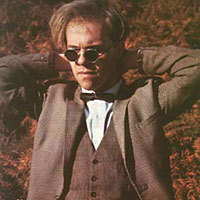
So at what point did you say to yourself that taking on the persona of a mad scientist was the way to visually launch your solo career?! I think that before She Blinded Me With Science that a lot of the photos that I had done had focused on the hobbyist aspect of old technology. The big brass knobs and levers and such. And in a way I consolidated it with SBMWS. MTV was just starting to happen and for the first time my record label were willing to give me a budget to make a music video.
I was excited by the medium and being a film fan I had always fancied writing and directing something myself. And so I basically came up with the script for SBMWS the video before I had even written the song. It actually became like a soundtrack for the video. They did not give me a huge budget - around 10,000 pounds - and we only had a day to shoot it, so we just did what we could in that day. It did not make much of an impact in the UK, because this was before MTV reached the UK. But in the States MTV was approaching it is most powerful period when it was really a pace maker. Hip people were staying at home to watch MTV instead of going out to clubs and things. And people in the States were talking about the British Invasion and the various bands out there that felt like a breath of fresh air after this dinosaur rock that was ruling American radio at the time.
And so here was this guy with a catchy song and a fun video. And the persona was deliberately opposite to the pin-ups of the time, such as Sting, Adam Ant and Simon LeBon. So I guess for just being contrarian really I got a lot of attention.
But were you yourself shocked by such an immediate positive response to your music and all the TV show requests that followed? I think it was a dream come true really. Every artist deep down they are driven to believe that all that has to happen is that the public hears your stuff and they will fall in love with you. That is what most artists believe more than anything, he laughs. And that becomes the most motivating factor. More than how much money you are gonna make or anything like that. If people realized how brilliant I was then they would flock to buy my stuff. And so when that actually started to happen for me ... yeah, it was a bit of a surprise.
I had never made it a top priority to make it as a pop, mainstream artist. Most of my heroes were cult artists that most record labels did not know what to do with and most people had never heard of. And I would have been quite happy to have joined those ranks. So it was something of a surprise to be so much in the mainstream."
And then not really that much of surprise when I did not have a string of those hits really. There was such a pressure on me to milk that formula for all it was worth: She Blinded Me With Geography, She Blinded Me With Dentistry, and whatever, but there was no way I was going to cave in to that kind of pressure. I had so much more to explore, you know. The next phase of music I made was a lot more introspective - Flat Earth, Screen Kiss and such. So, I was not willing to just fall into that groove and stay there.
So you are saying that it was a 100% self-instigated, self-conscious line of departure that you yourself made to quickly pull away from the mainstream? It most certainly was. To have a lot of mainstream success you need to have a great song ... and you also need to have a lot of luck. A lot of stars have to align to make it happen. And I think a lot of stars aligned to make sure SBMWS was here. And then after that I released Hyperactive, which commercially had the potential of SBMWS. And it was a hit in the UK, but in the States it just so happened the stars did not align. It got caught up in lots of political stuff between the label, MTV, radio, payola and all sorts of things like that. And they let it get away.
But, at that point I realized what was very important to me. It was not the chart success - and I realized just how fragile a house of cards the whole thing really was - and I thought what was I actually in this for? Was it actually that I had a need to be in the forefront of the public eye and top of the charts all the time or is it more that I want to express myself musically. And that I wanted to stay experimental and really push the envelope. And I just thought at the end of the day that my priorities were that that was more gratifying to me than just repeating the chart success. I was not just gonna keep putting out more commercial, fluffy, lightweight singles in the hope of having a string of successes. I decided to go into the deeper cuts and if that meant a lot of the numbers dropping away than so be it. I just thought I will end up with a more solider and loyal audience that I cared about verses something that is very superficial.
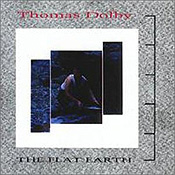
When you look back on your albums is there one that stands out to epitomize TD at his finest I should think that it was Flat Earth. I think that three of my albums were very parallel to three Prefab Sprout albums. Flat Earth and Steve McQueen were roughly the same time. Both had an innocence about them, a depth to them that moved people. Then the next albums were From Langley Park To Memphis and Aliens Ate My Buick which were both a lot more glossy, over saturated fun, tongue-in-cheek. And then the third was Jordan - The Comeback and Astronauts and Heretics which were both very literate, challenging, introspective works.
Those last two were albums that people blew a lot of column inches analyzing and discussing. And to a lot of hardcore fans were sort of Magnum opus for each of us. But I think everybody has a soft spot for Steve McQueen and The Flat Earth because they were just the right blend of simplicity and beauty.
Have you ever thought about remastered / remixing The Flat Earth recently? In a way I do a bit of that with my first two albums with my live show. I slightly deconstruct a few songs that maybe you have known for a couple of decades. But I have sort of taken the pieces and rebuilt them and so on. Beyond that I think it is time for me to move on and make some new stuff, really. I think there is a real danger with the amount of interest with nostalgia trips. People fall into two camps: Either people can reflect some of their former glory and you go and see them because you are kind of amazed that they are still alive. And there is the other artists that transcend all of that.
Two of my favorites are Kraftwerk and Brian Eno ... who were already tragically middle-aged, un-hip and balding when I first got into them, he laughs. So, decades later that is obviously the thing you do not judge them on. And you would not call Eno a 70s artist. He is an eternal artist. These are people that really transcend the decades and that is what I aspire to. But I can only prove that if I can come up with new material which weighs up well against the stuff I did back then.
And so have you begun writing for a brand new CD of material, perhaps? Yeah, I am writing for a new CD, yes. But whether it will be a CD or what, I just do not know. CD sounds like a quaint term at this point, he gently laughs. I am just starting to do this all again after a long gap and I will just see what comes of it. It could be an EP, it could a boxed-set, I really do not know what the unit of currency is going to be, he laughs a little harder.
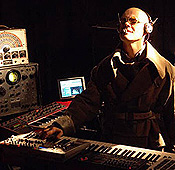
It was great seeing you out on tour last year It was something that I felt I needed to do rather than making sounds in a vacuum. I needed to get face-to-face with my audience and figure out who they were these days. To discover what the possibilities were for winning a new audience really. It was kind of a dry run for me as an artist. It was a very different set of conditions from when I started in the music industry. And I just wanted to get a taste of all that before making a new record that would be very important to me.
Which brings us nicely to your recently-released new live tour DVD, Live In Chicago. Yes, the Live In Chicago DVD is the live show from Martyrs in Chicago and the audio from that is the Sole Inhabitants CD that we also have for sale. If you want the audio only you can buy the Sole Inhabitants CD.
Finally, are you a perfectionist in all things? Pretty much yeah. I like things to be as good as they can be. And usually that does not leave a lot of room for improvisation or planned accidents or whatever. I am usually fairly premeditated when it comes to my work.
Interviewed by Russell A. Trunk
www.ThomasDolby.com
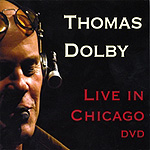
Live In Chicago DVD Purchase link
Sole Inhabitants DVD Purchase Link
Sole Inhabitants CD Purchase Link
Steve McQueen: Legacy Edition CD Purchase Link
Back To Archives

